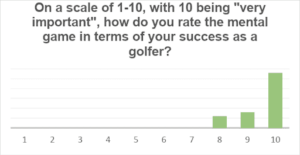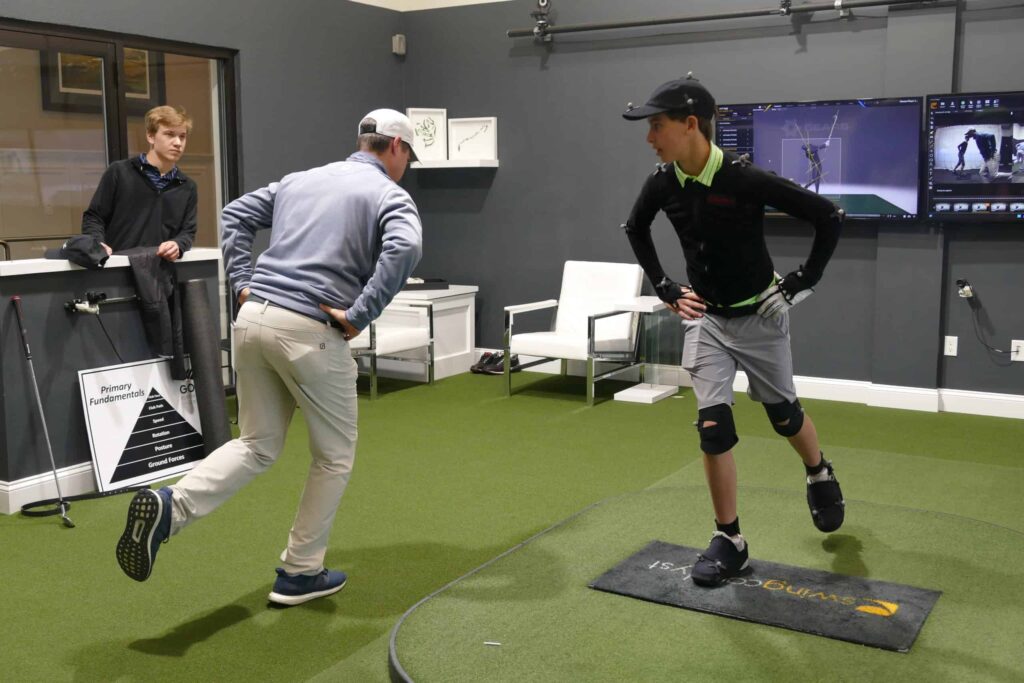With the 2021 golf season upon us, it’s time to start thinking about what you’d like to get out of this upcoming year from both your practice and on course play. What do you want this season to be about? Increased enjoyment of the game? Lower scores? Improved performance in tournament play? More effective practice time? Regardless of your motive, one thing is for certain; if you want to achieve your goals, the development of your mental game needs to be a top priority.
Throughout the course of my career I have asked golfers the following questions: “On a scale of 1-10, with 10 being “very important”, how do you rate the mental game in terms of your success as a golfer?” and “How often do you practice the mental game?” Here are the results of the last time I surveyed a group of people. Although the sample size was small (N=42), the results were quite telling and consistent with what I’ve found in the past. Below is some data worth noting:


With a weighted average of 9.52, it’s pretty clear that the golfers who responded to the survey believe the mental game is of significant importance to their success in the game. Amazingly, in spite of the high value golfers place on the mental game, only 14% of respondents reported practicing it on a regular basis. This data is not surprising given the lack of exposure and understanding most golfers have of the mental game, as well as its benefits, and how to incorporate it into their play.
As an entrée into the realm of the mental game, consider the following: In order to control your performance, you must first be able to control yourself. This statement is the fundamental doctrine of Sports Psychology and should be the central organizing principle for your upcoming season.
It doesn’t matter how technically sound your swing is, or how physically fit you are, without accurate awareness of both your mind and body and the subsequent ability to control it, you will never achieve your full potential as an athlete. Accurate awareness leads to choice. Inaccurate awareness leads to guessing, which in turn leads to frustration, self-doubt, and hours of ineffective practice and time wasted on the course.
So, in terms of developing accurate self-awareness and self-control, what are the psychological characteristics you need to be on the lookout for that will help improve your performance? According to research by Krane and Williams (2006), the following is a list of some of the most well researched psychological characteristics associated with elite athletes and peak performance:
Self-efficacy – Elite athletes have higher confidence both in themselves and their abilities, they have greater expectations of success, a more positive attitude and express more positive self-statements when compared to less successful athletes.
Concentration, Attention, and Focus – Elite athletes have strong performance focus, are better able to focus on the task at hand, have better attention control and refocusing skills when they get distracted when compared to less successful athletes.
Arousal regulation – Elite athletes are better able to monitor and fine tune their level of physiological arousal to an optimal state for peak performance, have developed well-learned and automatic coping skills to deal with sub-optimal levels arousal, and unlike less successful athletes, elite athletes peak under pressure.
Emotional regulation – Elite athletes cope well with perceived stress, able to effectively control their emotions being aware of which emotions interfere with performance and those that enhance it. Elite athletes view anxiety as facilitative and a natural part of performance. They report low levels or worry, and strong feelings of being in control when compared to less successful athletes.
Mindset/Attitude – Elite athletes have a growth mindset viewing difficult situations as challenging and exciting, and failure as an opportunity to learn. They are optimistic, have positive attitudes and cognitions, and are realistic in their evaluations of their performance. Elite athletes are better able to control their thinking and develop thought control strategies to reframe adversity. They recognize the importance of working on their weaknesses and are intrinsically motivated.
Grit – Elite athletes are gritty, determined, and fully committed. They are disciplined, mentally tough, competitive, and play without fear. Elite athletes are willing to make sacrifices to achieve their goals, and humbly strive for perfection.
Preparedness – Elite athletes are prepared on every level (i.e., physical, psychological, technical, strategic) regardless of whether they are practicing or competing. They possess a high sport specific intelligence, and always set specific, measurable, attainable, realistic, and timely goals.
Visualization/Imagery – Elite athletes are committed to using visualization and imagery as a critical component of their preparation both prior to and during competition.
All of the characteristics described above are skills that, like any other, can be practiced. In the same way a golfer invests time working on technical aspects of their swing, similar investments can be made working on skills like arousal regulation. After all, Tom Watson famously said, “I didn’t learn how to win until I learned how to breathe.”


